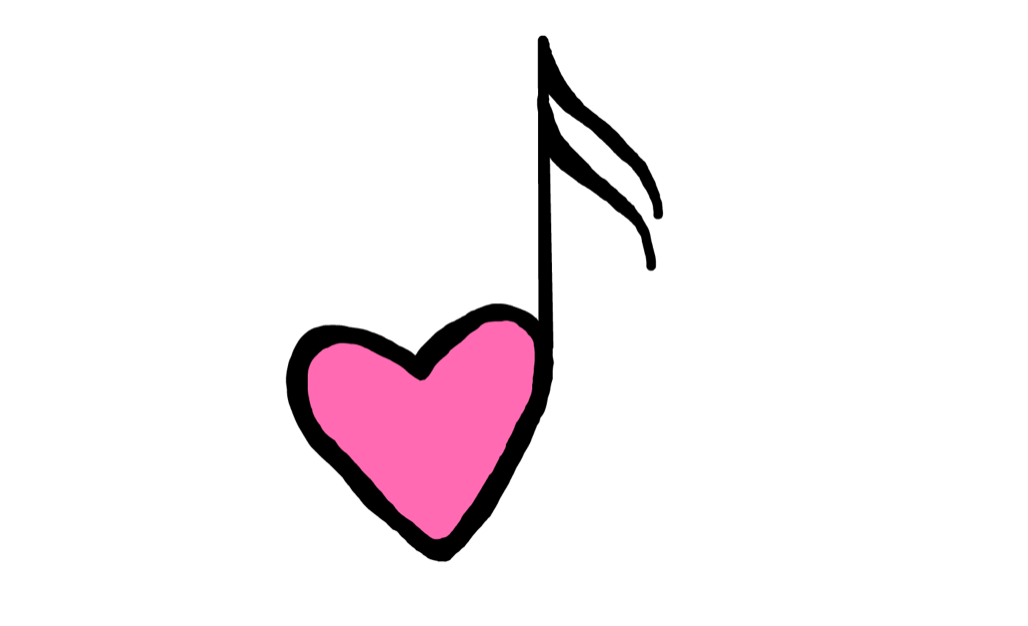“Without music, life would be a blank to me,” Jane Austen once said. Music has been a part of our lives since our early ancestors first walked the Earth (Greenberg). In fact, some people believe that music developed even before language (Greenberg)! Our ancestors clapped their hands and banged stones and sticks together (Frontiers). From there, a whole range of different types and styles of music developed, including, but not limited to, classical, opera, musical theater, jazz, pop, and rock. While these genres all seem radically different from one another, they are united by one fact: they are all a form of music, and music has the power to affect us all throughout our lives.
During the early stages of life, music has a long-term impact. When babies are born prematurely, they put on weight at a much faster pace when hearing music (Cormier). All across the world, mothers sing to their babies (University of Miami). Through this common activity, mothers, especially those with post-partum depression, gain a sense of empowerment and positivity, while infants strengthen their bond with their mother (University of Miami). Children with hearing issues that sing can better understand speech in noisy conditions (University of Helsinki, 2018). When autistic children create music during one-on-one therapy, they improve their ability to connect with others (University of Montreal). Music connects the “auditory and motor regions of the brain” in these children (University of Montreal).

Music also has a significant impact on health. In one study, patients that received surgery on the spine did not need to receive as much anesthesia when in the presence of music. (Cormier). In addition, it was found that people undergoing any type of surgery have a lower blood pressure when listening to music (“Music and health”). Music can assist people with different types of medical conditions, as well. People who have suffered a heart attack have reduced anxiety when in the presence of music (“Music and health”). Adults with Parkinson’s disease can improve their walking when listening to music (Cormier). People who have undergone strokes have difficulty with speaking, but music can help the right hemisphere of the brain to pitch in and help the affected person with speech (Cormier). Those with aphasia or Rett syndrome, both conditions that cause speech loss, can be stimulated by music (Cormier). Music therapy is used today by numerous individuals, including those who have suffered strokes (Cormier). Amazingly, music therapy even helps to increase the quality of life for cancer patients (Drexel University).
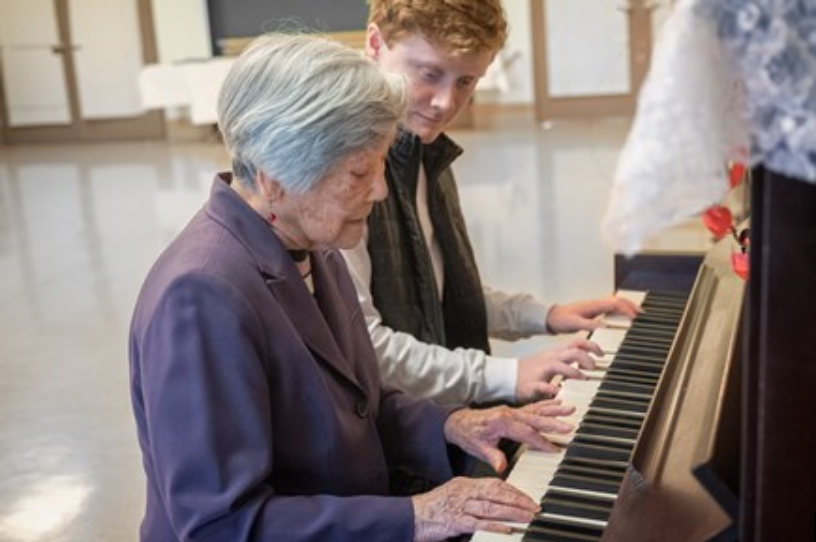
In addition to healthy development, music has an effect on many different aspects of life. Music programs at schools are usually the first to be cut, but there is proof that this is not the best idea. It has been found that students who study music, particularly through playing a musical instrument, perform better than others on core subject assessments (University of British Columbia). In the workplace, listening to music causes workers to have ideas greater than the ideas of their fellow employees (Padnani). Music also helps people fall asleep by blocking stimuli (PLOS). It is widely known that music reminds us of certain times in our lives (Whiteman). On top of this, music helps people to stop lingering on the past or future and brings them back to the present (Padnani).
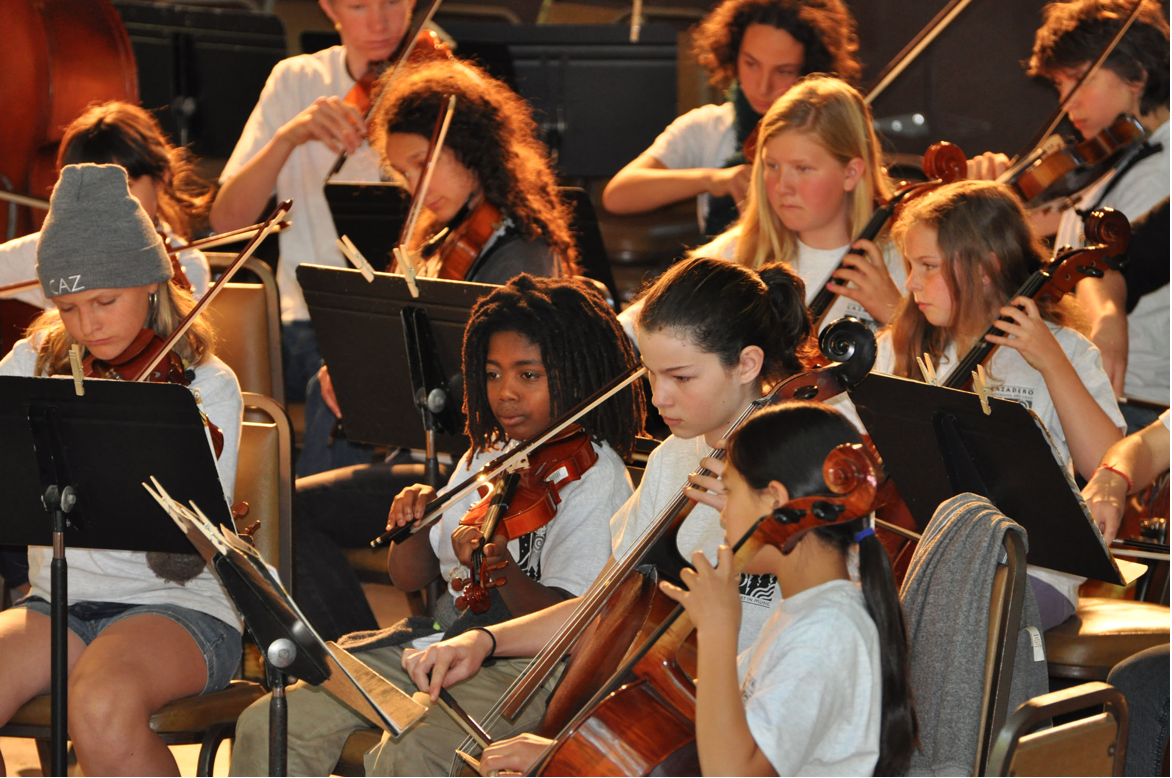
Music helps the “brain cells…to process information more efficiently” (“Music and health”). Music reduces the amount of stress hormones released into the body (“Music and health”). Music enhances the release of opiates, which reduce pain (Whiteman). When we listen to music that we are familiar with, our brains know when to expect the most enjoyable melodies with a rush of dopamine (“How Does Music…”). Dopamine can be found in the “reward area of the brain” (Padnani). Music also increases the number of antibodies and cells that increase immunity to bacteria (“How Does Music…”). Singing specifically releases endorphins and oxytocin, which increase pleasure and bonding, respectively (Horn). When music plays at 60 beats per minute, alpha waves are produced (“Releasing stress…”). These waves are associated with conscious relaxation (“Releasing stress…”). Rhythmic sound has the capability to coordinate the behavior and thinking of those in a group and “synchronize…brain waves” (Fields). This principle could explain why speech is characterized by syllables and why people dance at parties together (Fields). Perhaps the most astounding fact is that the entire brain becomes engaged when interacting with music (Cormier).
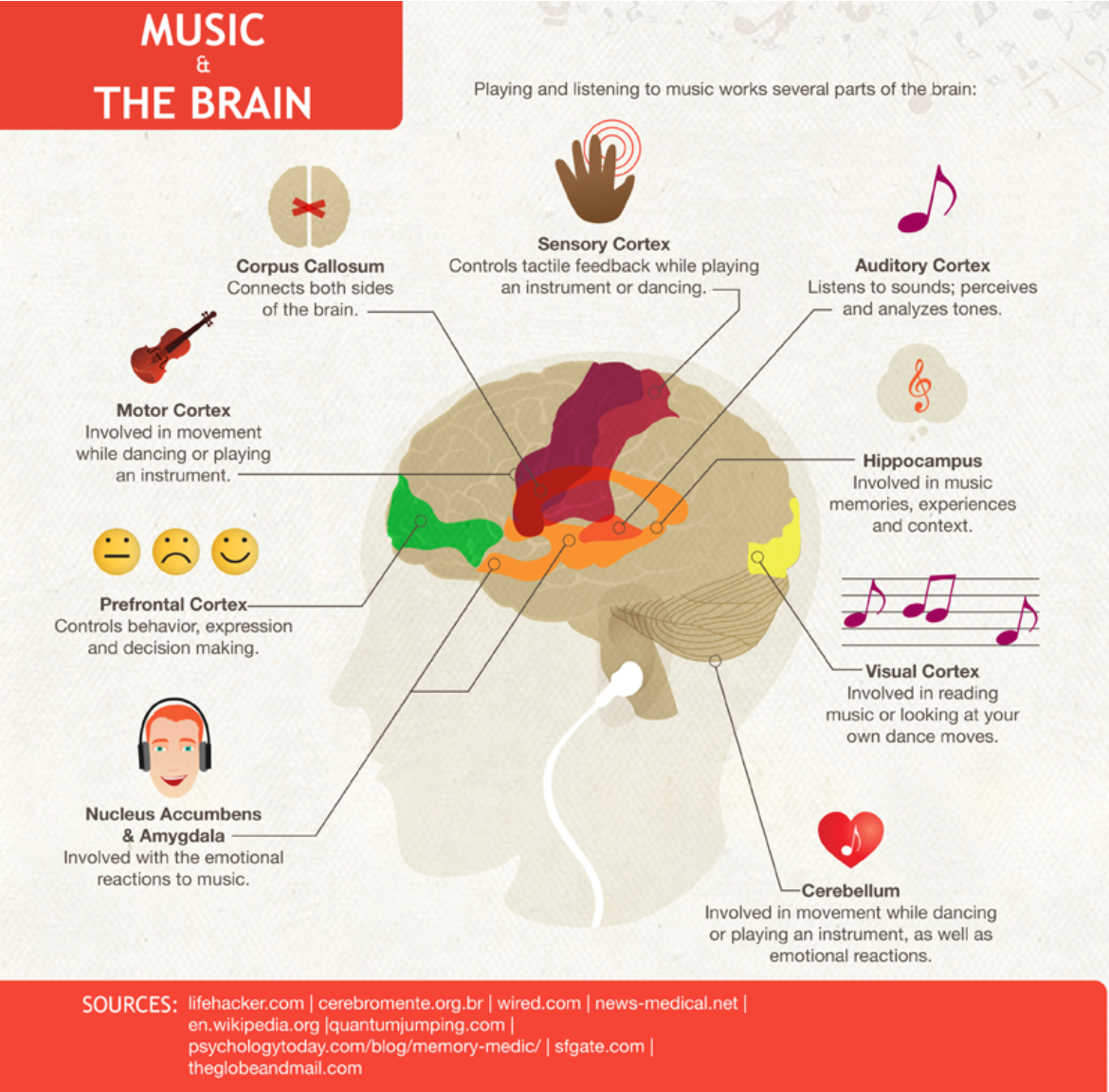
Those who play music obtain increased benefits. On one hand, they develop thicker gray matter, which is home to the synapses (where neuronal signals are received) (Cormier). On the other hand, the corpus callosum, which connects the two hemispheres of the brain, is thickened, as well (Cormier). Essentially, learning how to play an instrument assists with attention and memory (“Music and health”). For instance, older people have slower reaction times, and if they take up an instrument, they can improve their reaction times (Rampton). Singing also has many benefits. For instance, when 60 adults were assigned to learn Hungarian, those who sang phrases had a better memory (Whiteman). Singing in groups has been found to reduce stress and anxiety (Horn). Music has the power to control “the brain circuitry of sensory perception” (Fields). Thus, it isn’t surprising that musicians have an enhanced ability to integrate sensory information from hearing, touch, and sight (Bergland).
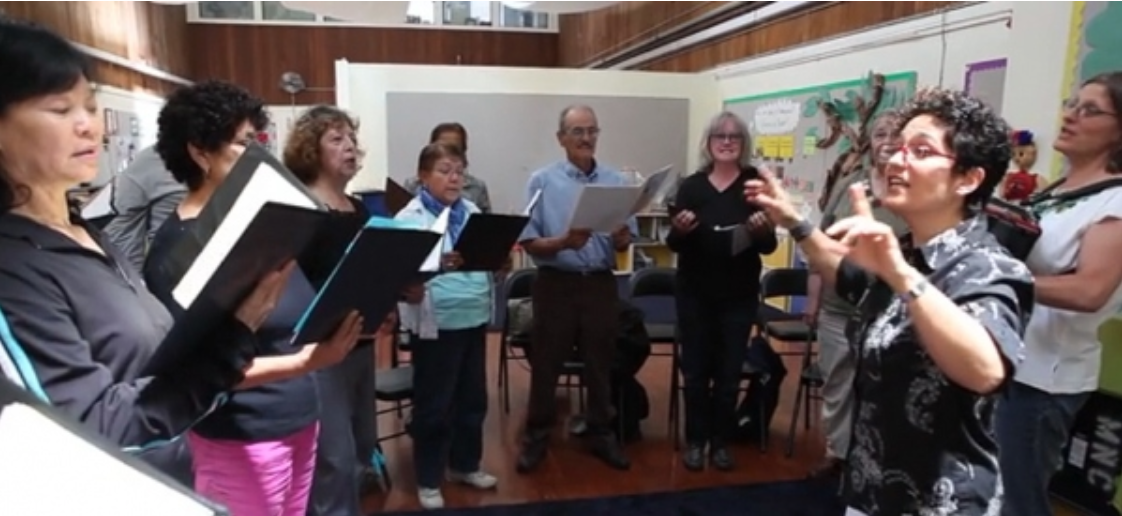
Many people refer to music as the “universal language”, but is that truly the case? According to research, this is one saying that is absolutely true. A finding from the field of ethnobiology has found that music connects the people of Indigenous communities with their land (University of Helsinki, 2019). In a broader study of different cultures around the world, it was found that certain kinds of music were used in the same kinds of contexts (University of Vienna). “For example, dance music is fast and rhythmic, and lullabies soft and slow — all around the world” (University of Vienna). Indeed, music contributes significantly to the diversity of life (University of Helsinki, 2019).
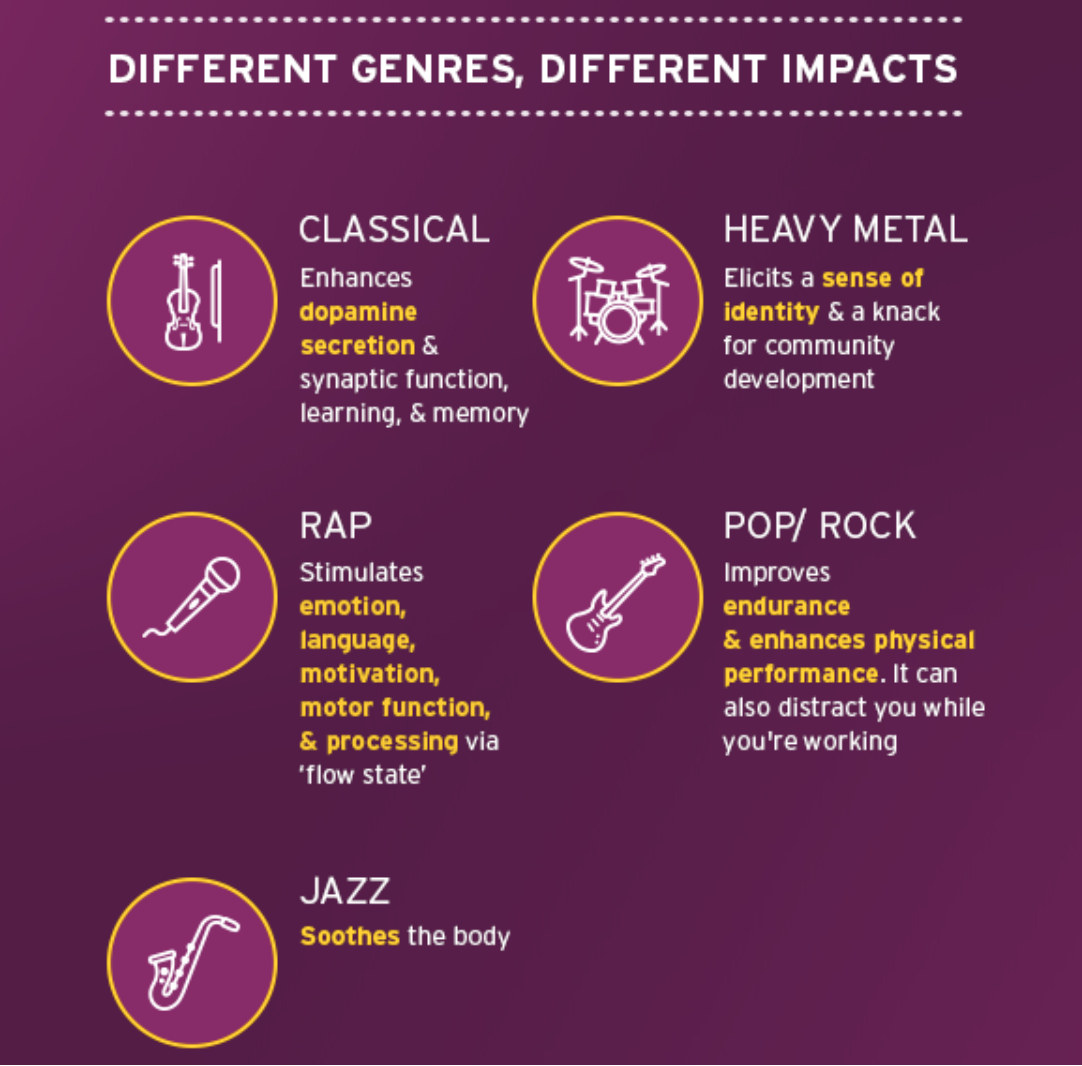
The power of music can be felt all around us. An autistic child gains confidence in interacting with others. A person with Parkinson’s disease becomes more mobile. A student performs better in school. A singer in a chorus feels a sense of joy. A musician finds that his or her memory has improved by strides. In fact, music helps keep all of us happier, healthier, and more connected. Personally, music has been a part of my life ever since I was born. From taking music classes when I was little to currently studying musical theater to listening to different types of music whenever I can, music is the art form that moves me the most. How has music affected your life?
Works Cited
Bergland, Christopher. “Musical Training Optimizes Brain Function.” Psychology Today, 13 Nov. 2013, https://www.psychologytoday.com/us/blog/the-athletes-way/201311/musical-training-optimizes-brain-function.
Cormier, Zoe, “The power of music for health.” Science Focus, 9 Oct. 2018, https://www.sciencefocus.com/the-human-body/the-power-of-music-for-health/.
Drexel University. “Music demonstrated to alleviate cancer patients’ symptoms.” ScienceDaily, 17 Aug. 2016, https://www.sciencedaily.com/releases/2016/08/160817131934.htm.
Fields, Douglas. “The Power of Music: Mind Control by Rhythmic Sound.” Scientific American, 19 Oct. 2012, https://blogs.scientificamerican.com/guest-blog/the-power-of-music-mind-control-by-rhythmic-sound/.
Frontiers. “The story of music is the story of humans.” ScienceDaily, 20 June 2017, https://www.sciencedaily.com/releases/2017/06/170620093153.htm.
Greenberg, David. “What Is Music…Exactly?” Psychology Today, 3 Aug. 2016, https://www.psychologytoday.com/us/blog/the-power-music/201608/what-is-music-exactly.
Horn, Stacy. “Singing Changes Your Brain.” TIME, 16 Aug. 2013, https://ideas.time.com/2013/08/16/singing-changes-your-brain/.
“How Does Music Affect Your Brain?” Ashford University, 7 June 2017, https://www.ashford.edu/online-degrees/student-lifestyle/how-does-music-affect-your-brain.
“Music and health.” Harvard Health Publishing, July 2011, https://www.health.harvard.edu/staying-healthy/music-and-health.
Padnani, Amisha. “The Power of Music, Tapped in a Cubicle.” The New York Times, 11 Aug. 2012, https://www.nytimes.com/2012/08/12/jobs/how-music-can-improve-worker-productivity-workstation.html.
PLOS. “How we use music as a possible sleep aid.” ScienceDaily, 14 Nov. 2018, https://www.sciencedaily.com/releases/2018/11/181114160033.htm.
Rampton, John. “The Benefits of Playing Music Help Your Brain More Than Any Other Activity.” Inc., 21 Aug. 2017, https://www.inc.com/john-rampton/the-benefits-of-playing-music-help-your-brain-more.html.
“Releasing stress through the power of music.” University of Nevada, Reno, n.d., https://www.unr.edu/counseling/virtual-relaxation-room/releasing-stress-through-the-power-of-music.
University of British Columbia. “Music students do better in school than non-musical peers.” ScienceDaily, 24 June 2019, https://www.sciencedaily.com/releases/2019/06/190624111504.htm.
University of Helsinki. “Music is essential for the transmission of ethnobiological knowledge.” ScienceDaily, 26 Sept. 2019, https://www.sciencedaily.com/releases/2019/09/190926112632.htm.
University of Helsinki. “Music supports the auditory skills of hearing-impaired children.” ScienceDaily, 27 Nov. 2018, https://www.sciencedaily.com/releases/2018/11/181127111009.htm.
Whiteman, Honor. “The power of music: how it can benefit health.” Medical News Today, 19 Nov. 2015, https://www.medicalnewstoday.com/articles/302903#Helping-recover-brain-injury,-treat-seizures.
University of Miami. “Mothers and infants connect through song.” ScienceDaily, 17 Feb. 2017, https://www.sciencedaily.com/releases/2017/02/170217012453.htm.
University of Montreal. “Music improves social communication in autistic children.” ScienceDaily, 5 Nov. 2018, https://www.sciencedaily.com/releases/2018/11/181105081708.htm.
University of Vienna. “Universal features of music around the world.” ScienceDaily, 22 Nov. 2019, https://www.sciencedaily.com/releases/2019/11/191122113300.htm.

